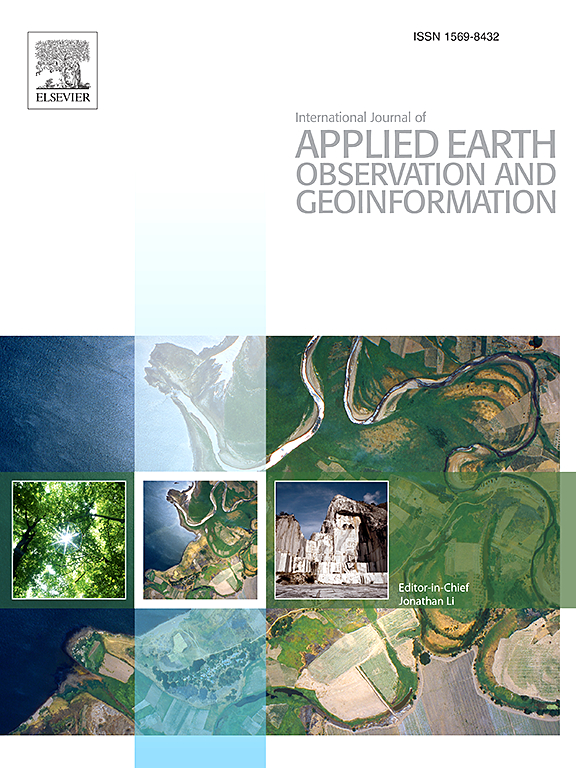Evaluation of average leaf inclination angle quantified by indirect optical instruments in crop fields
IF 8.6
Q1 REMOTE SENSING
International journal of applied earth observation and geoinformation : ITC journal
Pub Date : 2024-10-21
DOI:10.1016/j.jag.2024.104206
引用次数: 0
Abstract
Average leaf inclination angle () is an important canopy structure variable that influences light regime, photosynthesis, and evapotranspiration of plants. can be measured through direct methods (e.g., protractor), which are labor-intensive and time-consuming, or through indirect optical instruments, which are more efficient than the direct methods. However, uncertainties of different indirect optical instruments for quantifying remain largely unquantified. In this study, we evaluated and compared the performances of three major indirect optical instruments: (1) LAI-2200, (2) 30°-tilted camera, and (3) digital hemispherical photography (DHP), in different crop fields over a growing season, benchmarked with direct measurements. LAI-2200 and 30°-tilted camera showed higher agreement with direct measurements (R2 = 0.54, RMSE = 7.37°; R2 = 0.58, RMSE = 8.08°) than DHP (R2 = 0.14, RMSE = 13.96°). Different performances of indirect optical instruments could be attributed to the accuracy of gap fraction measurement and the performance of the quantification algorithms. When using the LAI-2200 algorithm, larger gap fraction gradients over view zenith angles led to larger values, and smaller gap fraction gradients led to smaller values. Such error propagation was larger in sparse canopy than in dense canopy. The Wilson G function of the LAI-2200 algorithm performed better in estimating than the G function based on the ellipsoidal LAD function used by the CAN_EYE algorithm. We also proposed a modification of the LAI-2200 algorithm, which further improved the performance of LAI-2200 and 30°-tilted cameras in estimating . We envision that the low-cost 30°-tilted cameras provide a promising sensor solution to continuously monitor canopy structure for various ecosystems.
评估用间接光学仪器量化的农作物叶片平均倾角
平均叶倾角(θ¯L)是一个重要的冠层结构变量,影响植物的光照制度、光合作用和蒸腾作用。θ¯L 可通过直接方法(如量角器)或间接光学仪器测量,前者耗费大量人力和时间,后者比直接方法更有效。然而,用于量化 θ¯L 的不同间接光学仪器的不确定性在很大程度上仍未量化。在这项研究中,我们评估并比较了三种主要间接光学仪器的性能:(1) LAI-2200、(2) 30°倾斜照相机和 (3) 数字半球摄影(DHP)。LAI-2200 和 30° 倾斜相机与直接θ¯测量值的一致性(R2 = 0.54,RMSE = 7.37°;R2 = 0.58,RMSE = 8.08°)高于 DHP(R2 = 0.14,RMSE = 13.96°)。间接光学仪器的不同性能可归因于间隙分数测量的准确性和 θ¯L 量化算法的性能。在使用 LAI-2200 算法时,视场天顶角的间隙分数梯度越大,θ¯L 值就越大,而间隙分数梯度越小,θ¯L 值就越小。这种误差传播在稀疏冠层中比在茂密冠层中更大。LAI-2200 算法的 Wilson G 函数在估算 θ¯L 时的表现优于 CAN_EYE 算法使用的基于椭球 LAD 函数的 G 函数。我们还提出了对 LAI-2200 算法的改进,进一步提高了 LAI-2200 和 30° 倾斜相机在估计 θ¯L 方面的性能。我们认为,低成本的 30° 倾斜相机为持续监测各种生态系统的冠层结构提供了一种前景广阔的传感器解决方案。
本文章由计算机程序翻译,如有差异,请以英文原文为准。
求助全文
约1分钟内获得全文
求助全文
来源期刊

International journal of applied earth observation and geoinformation : ITC journal
Global and Planetary Change, Management, Monitoring, Policy and Law, Earth-Surface Processes, Computers in Earth Sciences
CiteScore
12.00
自引率
0.00%
发文量
0
审稿时长
77 days
期刊介绍:
The International Journal of Applied Earth Observation and Geoinformation publishes original papers that utilize earth observation data for natural resource and environmental inventory and management. These data primarily originate from remote sensing platforms, including satellites and aircraft, supplemented by surface and subsurface measurements. Addressing natural resources such as forests, agricultural land, soils, and water, as well as environmental concerns like biodiversity, land degradation, and hazards, the journal explores conceptual and data-driven approaches. It covers geoinformation themes like capturing, databasing, visualization, interpretation, data quality, and spatial uncertainty.
 求助内容:
求助内容: 应助结果提醒方式:
应助结果提醒方式:


